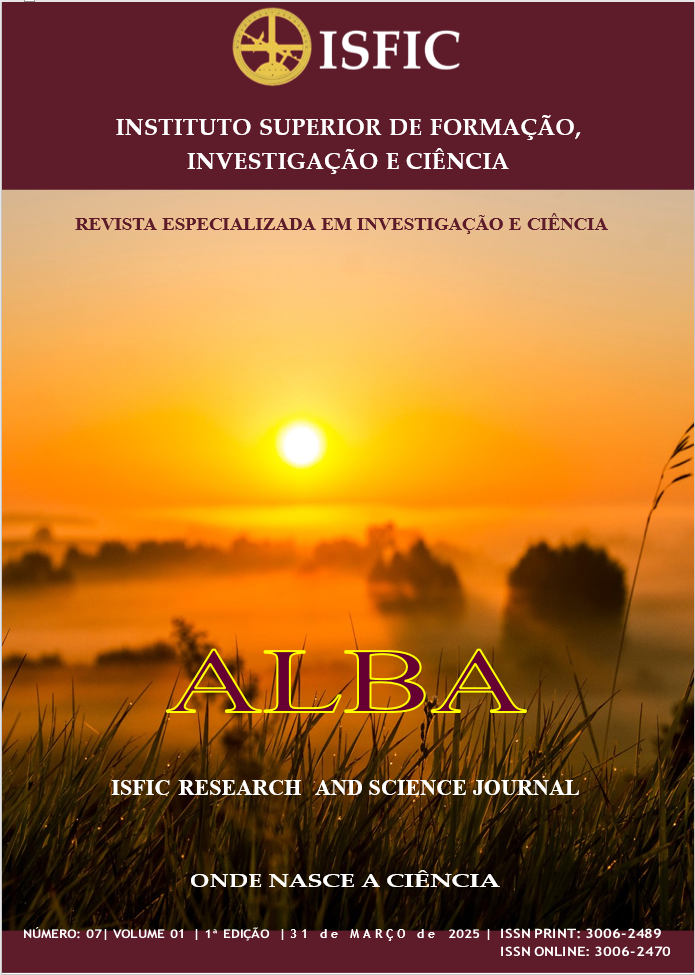Impacts of entrepreneurial action on the survival of communities: A study on the bairro Vinte oito de Augosto (AKA bairro da Lixeira) may 2024
Keywords:
Entrepreneur, community, survival, economy.Abstract
The fundamental focus of this article is to understand the impacts of entrepreneurial action on the survival of communities, in such a way that field research was carried out in the Vinte Oito de Agosto neighborhood in Luanda, whose common name is Lixeira, in order to find out how the community is impacted by entrepreneurial action and how they can survive with a new group of entrepreneurs. It was pertinent to develop concepts about economic systems where everyone is involved with the help of methodological rigor through the research methods and techniques used to achieve results. The research was based on a survey submitted to a stratified random non-probabilistic sample and the questions were answered in order to conclude that the impacts of entrepreneurial action will lead to the survival of families.
Downloads
References
Angola, Decreto Presidencial n.º 190/12, de 24 de Agosto. Disponível em: http://www.gckcc.ao/attachments/article/382/Decreto_Presidencial_190_2012_de_24_de_Agosto_Regulamento_sobre_Gestao_de_Residuos.pdf. Acesso em: 10/05/2024.
Barreto, L. P. (1998). Educação para o empreendedor. Educação brasileira.
Brealey, R.; & Myers, S. (1998). Princípios de finanças empresariais; 5ª edição; McGrawHill.
Bunge, M. (1976). La investigación cientfica: su estrategia y su filosofia 5. ed. Barcelona: 2 Ariel.
Chang, H. (2002). Rompendo o modelo: uma economia política institucionalista alternativa à teoria neoliberal do mercado e do Estado. In: ARBIX, Glauco; COMIN, A.; ZILBOVICIUS, M.; ABRAMOVAY, R. (Org.). Brasil, México, África do Sul, Índia e China. São Paulo: Editora da Unesp.
Chiavenato, I. (2004). Empreendedorismo: dando asas ao espírito empreendedor. São Paulo: Saraiva.
Costa, P. C. (2011). Kixikila e o Desenvolvimento Local em Angola Dissertação submetida como requisito parcial para obtenção do grau de Mestre em Desenvolvimento, Diversidades Locais e Desafios Mundiais. Escola de Ciências Sociais e Humanas Departamento de Economia Política, Outubro.
Coyle, D. (2014). GDP: A Brief but Affectionate History. Princeton, NJ: Princeton University Press.
Cunha, P. O. (2016). Corporate & Public Governance em Portugal em 2016: fragilidades decorrentes da soft law.
Dornelas, J. C. A. (2008). Empreendedorismo: transformando idéias em negócios. Rio de Janeiro: Elsevier.
Kotler, P.; & Keller, R, K, L. (2006). Administração de Marketing.12° edição , São Paulo; Pearson Prentice Hall.
Lakatos, E. M. (2017). Fundamentos de metodologia científica / Marina de Andrade Marconi, Eva Maria Lakatos. – 8. ed. – São Paulo: Atlas.
Langlois, R. N.; & Robertson, P. L. (1995). Firms, markets and economic change- a dynamic theory of business institutions. London and New York: Routledge.
Mankiw, N. G. (2005). Introdução à Economia. São Paulo: Pioneira Thomson Lear ning.
Melo, F. P; & Froes, C. (2002). Empreendedorismo Social: a transição para a sociedade sustentável. Rio de Janeiro: Qualitymark.
Mendes, C. M. [et al.]. (2007). Economia (introdução) – Florianópolis: Departamento de Ciências da Administração / UFSC.
Mill, J. S. (1983). Princípios de economia política. São Paulo: Abril Cultural,
NEVES, J. C. (2000). Análise Financeira Volume I – Técnicas Fundamentais; 12ª.
Rogers, D. et al. (2014). Crédito Informal: utilização e sua relevância em micro e pequenas empresas. Conference Paper · October.
Romer, D. (1996). Advanced Macroeconomics. New York: McGraw-Hill.
Romer, D. (2002). Macroeconomia Avançada. 2. ed. Madrid: McGraw-Hill.
Schumpeter, J. A. (1961). Teoria do Desenvolvimento Econômico. Rio de Janeiro: Editora Fundo de Cultura.
Stone, R. (2013). The role of measurement in economics (Vol. 3). Cambridge: Cambridge University Press.
Relatório do Instituto Nacional da Comunicação (INACOM), 2022.
Banco Fomento Angola (2021 - 2017) Relatórios e Contas.







